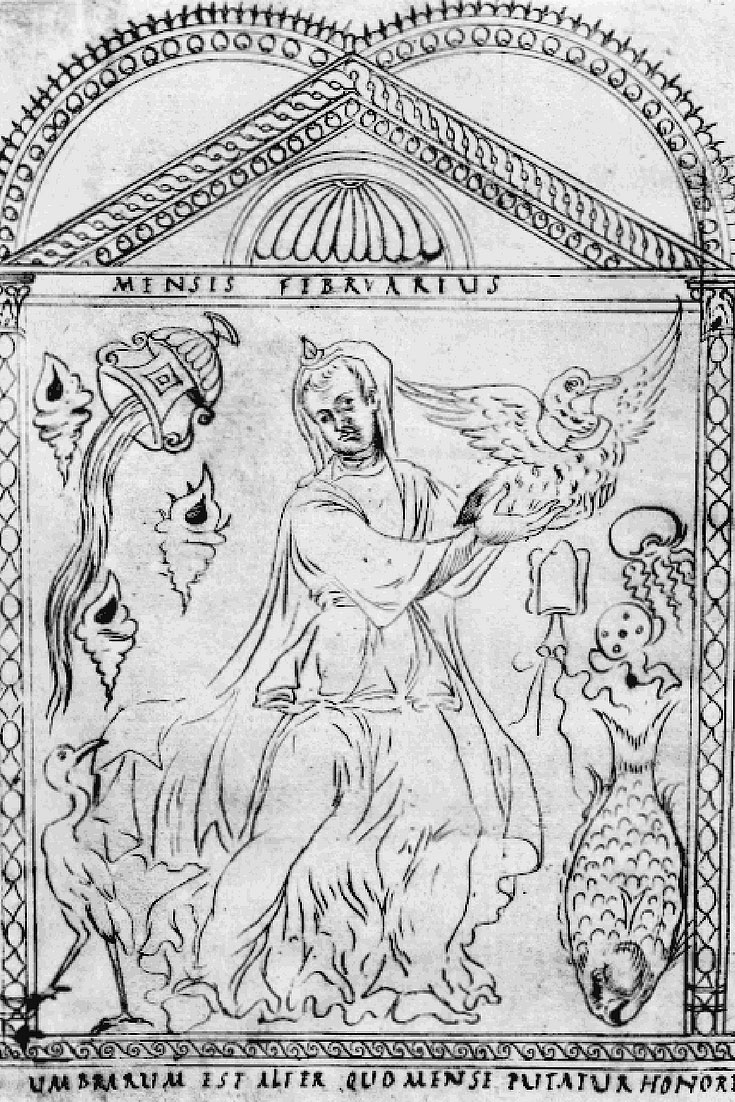
February, fragment of a mosaic with the months of the year. From Tunisian colony of Hadrumetum, first half of the third century. Ad Meskens / wikimedia / 2012 / CC BY-SA 3.0
Idus Februarias, a Roman holiday, falls on what is now the 13th of February in our modern Gregorian calendar.
The Ides were a religious festival that actually went on for 9 days, from the 13th through to the 21st of February inclusive. The first day, the 13th, was called the “Idus Februarias”; the entire period was called the “parentalia.”
The Romans believed that February was a month in which the souls of the dead could enter this world. Consequently, this became a period to honour your ancestors with offerings at their tombs. Romans would leave flowers, a trickle of wine, bread crumbs, or a sprinkle of salt.
This is similar to what Mexicans now do on the Day of the Dead at the start of November.

Roman cemetary at Scupi, Macedonia, near today’s Skopje. Prince Roy / flickr.com / 2012 / CC BY 2.0
The Roman calendar evolved a great deal over the course of 1300+ years, but in the earliest form, around 800 BC onwards, the Ides marked the day of a month when the full moon would occur. This was the 15th day of March, May, July, and October; for all other months, it was the 13th.
March was the first month of the year in the early calendar. When the months January and February were added at the start, in order to not interfere with religious festivals and traditions March was still treated as the first month of the year. That made February, coming before March, the last month of the year, festival-wise, and a perfect month in which to honour the dead. [1]Fowler, W. Warde. The Roman Festivals of the Period of the Republic. New York: Macmillan & Co. 1899. Page 5.
The entire month of February was dedicated to Mars and Juno.
See also: Roman Food, Roman Holidays
#IdesOfFebruary

Month of February from the Chronography of 354 by the 4th century kalligrapher Filocalus. The Latin reads in full: umbrarum est alter, quo mense putatur honore / pervia terra dato manibus esse vagis (“February is in honour of the ‘shades’, when the earth is thought to be pervious to the wandering Manes (spirits)”). A.E. Housman, “Disticha de Mensibus (Anth. Lat. Ries. 665, Poet. Lat. min. Baehr. I ppp. 210f.),” in The Classical Papers of A.E. Housman: 1915–1936, edited by J. Diggle and F.R.D. Goodyear (Cambridge University Press, 1972), vol. 3, p. 1187. Filocalus / wikimedia / 354 AD / Public Domain
References
| ↑1 | Fowler, W. Warde. The Roman Festivals of the Period of the Republic. New York: Macmillan & Co. 1899. Page 5. |
|---|

